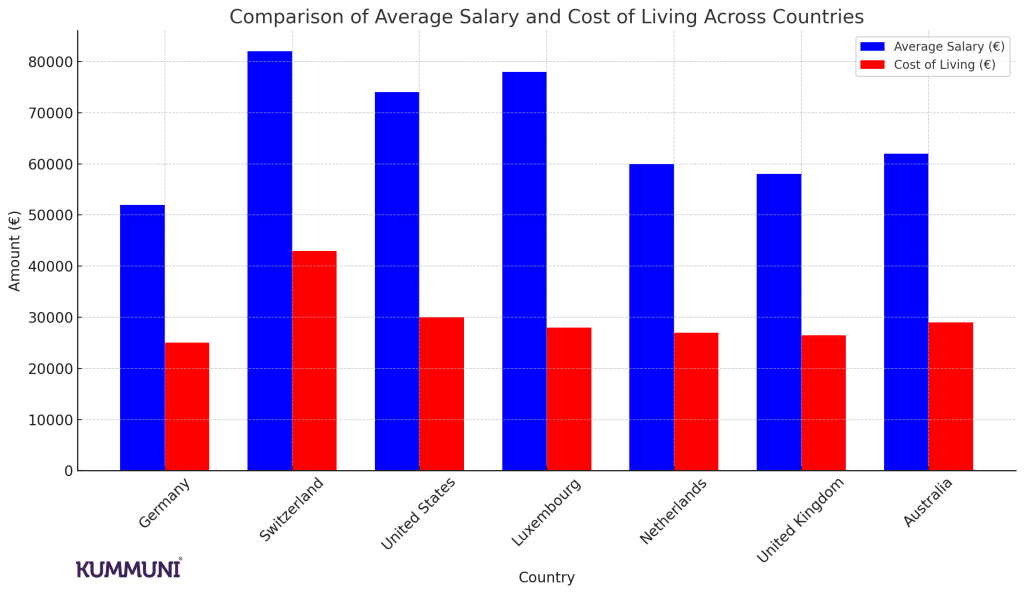Starting Salary Expectations After Ausbildung in Germany for International Students in 2025
Study abroad consultant with expertise in European education systems.

Study abroad consultant with expertise in European education systems.

— in Country Guides
— in Country Guides
— in Country Guides
— in Country Guides
— in Country Guides
Ausbildung is a dual vocational training system unique to Germany. It combines theoretical learning at a vocational school with practical, on-the-job training at a company.
This approach provides a well-rounded education. It equips graduates with both the academic knowledge and hands-on skills required by the German job market.
Ausbildung programs typically last between two and three and a half years. The duration varies depending on the specific profession.
Trainees spend part of their time in a vocational school learning the theoretical aspects of their chosen field. The rest of the time is spent working at a company, gaining practical experience.
Proficiency in German is crucial for success in an Ausbildung program. Most programs require at least a B1 or B2 level of German language proficiency.
This is because both classroom instruction and workplace communication are primarily in German. A strong command of the language enhances learning and integration into the workplace.

Graduates of Ausbildung programs can expect competitive starting salaries. According to recent data, the average starting salary for full-time employees in Germany is around €45,900 annually, or €3,830 per month.
However, these figures can vary based on several factors. These factors include industry, specific role, and geographic location.
The industry you choose plays a significant role in determining your starting salary. High-demand sectors like IT, engineering, and healthcare often offer higher salaries compared to other fields.
For instance, IT specialists and nurses are among the highest-paid Ausbildung graduates. Their salaries reflect the critical need for skilled professionals in these areas.
Where you work in Germany also affects your earnings. Cities like Munich, Frankfurt, and Stuttgart, known for their higher cost of living, generally offer higher salaries.
This is to compensate for the increased expenses associated with living in these urban centers. Salaries in smaller towns or rural areas might be lower but are often coupled with a lower cost of living.
The IT and engineering sectors are booming in Germany. They are projected to continue their growth trajectory in 2025.
International students graduating from Ausbildung programs in IT or engineering can expect excellent job prospects. This is especially true in areas like software development, automation technology, and mechatronics.
Healthcare is another sector with a high demand for skilled workers. This is particularly true for nursing professionals.
Germany's aging population and ongoing healthcare reforms ensure a continuous need for qualified nurses. International graduates in nursing can find numerous opportunities in hospitals, clinics, and nursing homes.
The hospitality and tourism industry also offers promising opportunities. This is especially true in tourist hotspots and major cities.
Roles in hotel management, culinary arts, and event planning are available. They often come with competitive salaries and the chance to work in a dynamic environment.
| Industry | Average Starting Salary (Monthly) |
|---|---|
| IT Specialist | €3,000 - €3,500 |
| Engineering | €2,200 - €2,800 |
| Healthcare and Nursing | €2,400 - €2,800 |
| Hospitality and Tourism | €1,800 - €2,200 |
| Mechatronics | €2,200 |
Note: These figures are approximate and can vary based on specific roles and companies.

Housing is typically the most significant expense for international students. Rent prices vary widely depending on the city and type of accommodation.
In major cities like Munich or Berlin, a one-bedroom apartment can cost between €1,000 and €1,400 per month. In smaller cities, rent can range from €500 to €800.
Food costs average around €200 to €300 per month. This depends on whether you cook at home or eat out.
Transportation costs can range from €50 to €100 per month. This depends on whether you use public transport or own a vehicle.
Creating a budget is essential. It will help you manage your finances effectively.
Track your income and expenses. Prioritize essential costs like rent, food, and health insurance. Explore student discounts, part-time job opportunities, and shared living arrangements to reduce expenses. For example, you can work for 140 full days or 280 half-days per year.

Graduates can find roles such as IT specialists, mechatronics engineers, nurses, hotel managers, and chefs. These positions are available across various companies, from small businesses to large corporations.
The practical skills and theoretical knowledge gained during the Ausbildung make graduates highly employable. Many companies prefer hiring candidates who have completed this type of training.
Networking is crucial for finding job opportunities. Attend job fairs, industry events, and networking sessions to connect with potential employers.
Utilize online job portals, company websites, and professional networking platforms like LinkedIn. These can help you stay updated on job openings and connect with professionals in your field.
International students from non-EU countries can work up to 140 full days or 280 half-days per year. This allows students to earn extra income while gaining work experience.
However, it's important to balance work with studies. This ensures that academic performance is not compromised.
After completing the Ausbildung, international graduates can apply for a job-seeking visa. It allows them to stay in Germany for up to 18 months to look for employment.
Once you secure a job related to your qualification, you can apply for a work permit. You can also pursue further education opportunities to enhance your career prospects.

Ausbildung programs offer a unique blend of theoretical and practical training, leading to competitive starting salaries for international graduates. Key factors influencing salary expectations include the chosen industry and geographic location. High-demand sectors like IT, engineering, and healthcare provide numerous job opportunities.
The future looks bright for international students completing Ausbildung in Germany. The demand for skilled workers in various industries ensures ample job opportunities.
Continuous professional development, networking, and staying informed about industry trends will further enhance career prospects. With its robust economy and high quality of life, Germany remains an attractive destination for international students seeking to build successful careers.
Key Takeaways: